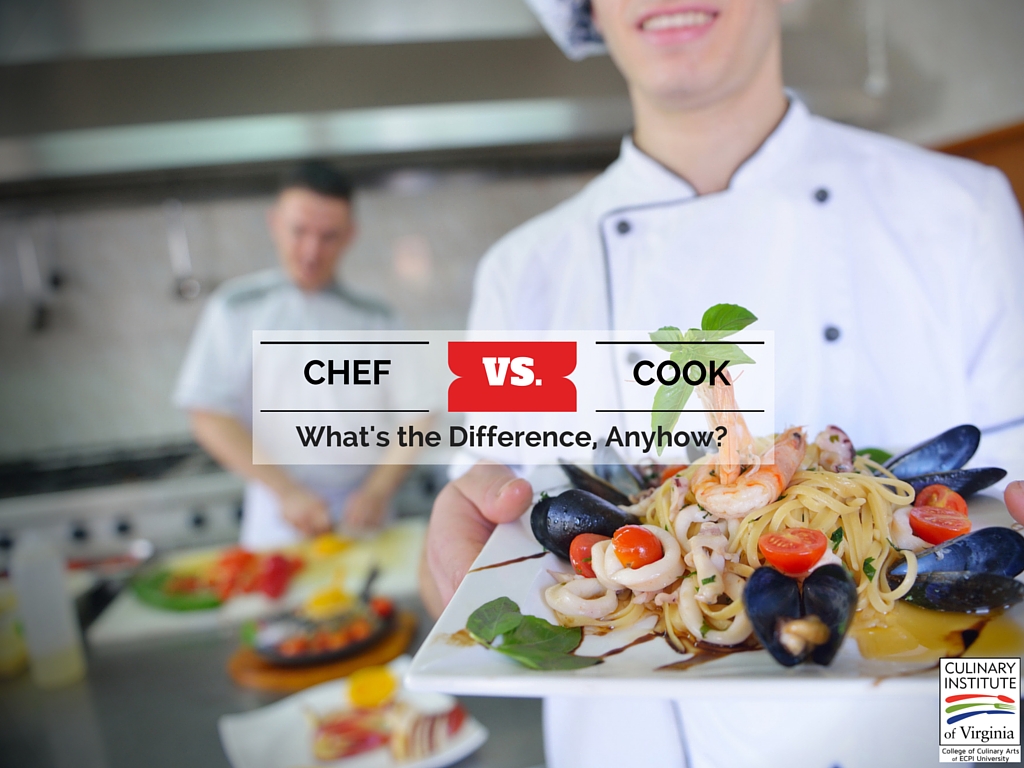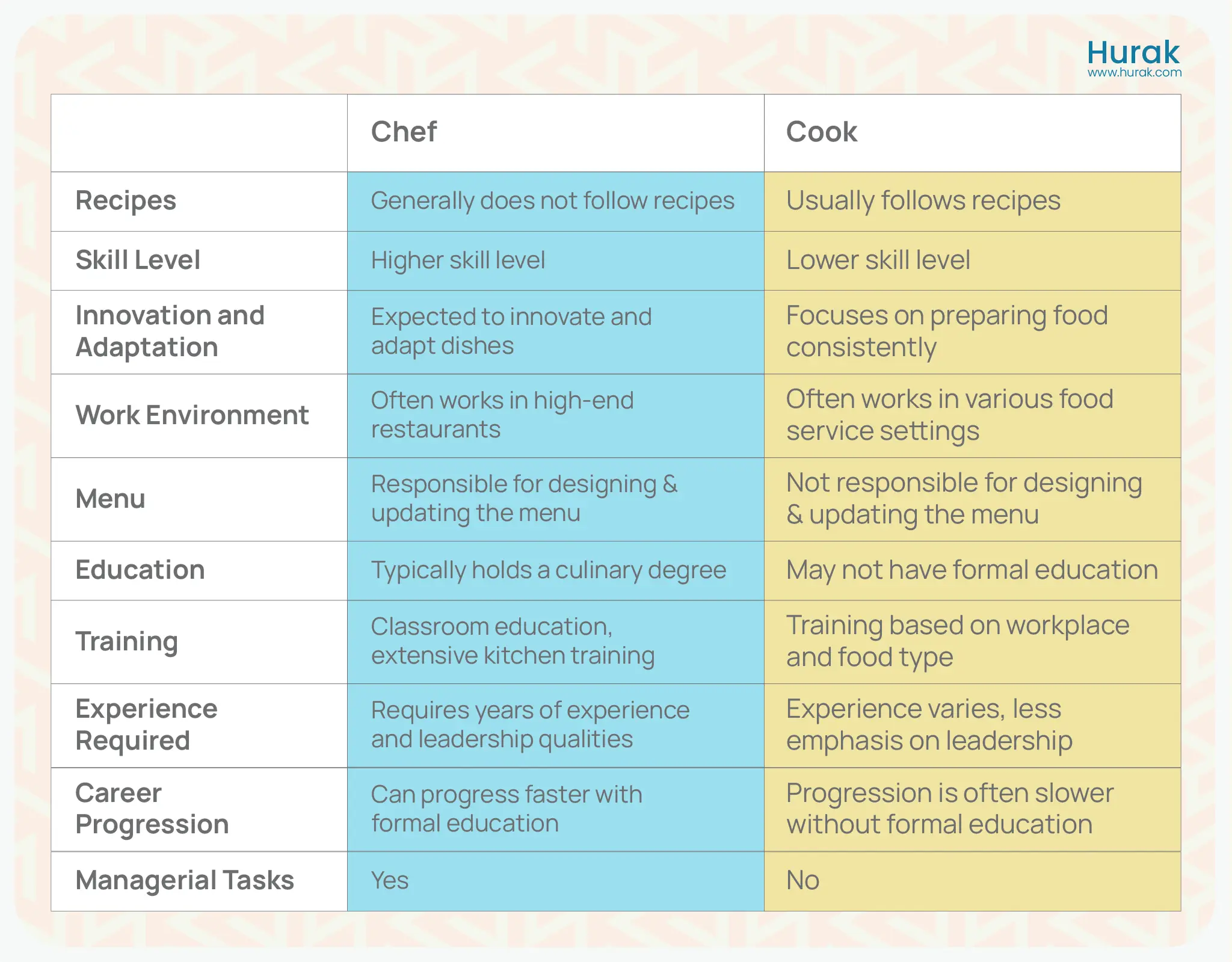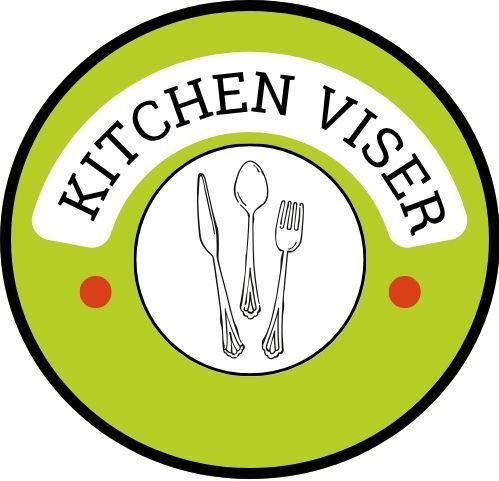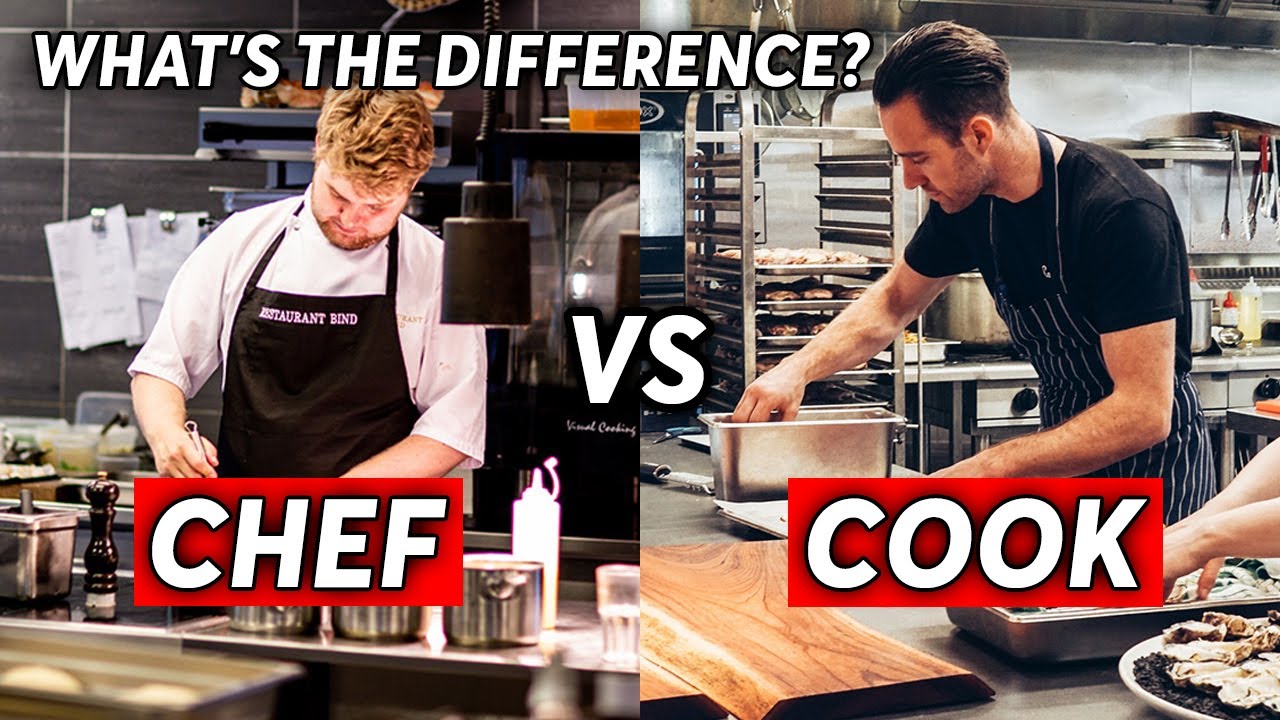Have you ever wondered about the difference between a chef and a cook? You might think they both do the same job — whipping up delicious meals in the kitchen.
But there’s more to it than meets the eye. Understanding the subtle distinctions can enhance your appreciation for culinary art and even inspire you in your own kitchen adventures. By the end of this article, you’ll uncover the unique roles, skills, and responsibilities that set chefs and cooks apart.
So, if you’re curious to learn who’s behind your favorite dishes and what makes them tick, you’re in the right place. Let’s dive in to unravel the mystery and see how these two culinary artists contribute to the flavors we love.

Credit: www.ecpi.edu
Roles And Responsibilities
Chefs create menus and manage the kitchen, focusing on creativity and leadership. Cooks follow recipes and prepare meals, ensuring consistency and quality in dishes.
Understanding the roles and responsibilities of a chef and a cook can be enlightening, especially if you’re passionate about the culinary world. While both contribute significantly to the dining experience, their duties differ in scope and complexity. The distinction isn’t just in the title but in the skills, tasks, and expectations that each role demands. Let’s break down these differences to help you appreciate the nuances of the kitchen hierarchy.Job Titles And Hierarchies
In a professional kitchen, titles indicate levels of experience, expertise, and responsibility. A chef often leads the team, setting the menu and ensuring quality standards. They might hold titles such as Executive Chef or Head Chef, which involve overseeing the entire kitchen operation. On the other hand, cooks are the backbone of daily operations. They might be called Line Cooks or Prep Cooks, reflecting their specific duties. While they follow the chef’s guidance, their primary role is to execute the menu with precision and consistency. Imagine a symphony where the chef is the conductor, setting the tempo and mood, while the cooks are the musicians, bringing the music to life. Each role is crucial, yet distinct in its contribution.Daily Duties And Tasks
Chefs spend their day planning and innovating. They create new recipes, manage inventory, and ensure that every dish meets the restaurant’s standards. They’re like the architects of your dining experience, crafting each element to perfection. Cooks, however, focus on execution. Their day revolves around preparing ingredients, cooking dishes, and maintaining cleanliness and efficiency. They are the hands-on experts who turn plans into reality, often working under tight deadlines. Consider this: while a chef might conceptualize a new dish, it’s the cook who tests it repeatedly until it’s just right. This collaboration is what makes dining out a consistently delightful experience. Are you more drawn to the creative leadership of a chef or the hands-on craft of a cook? Understanding these roles can guide your culinary journey, whether as a professional or an enthusiastic foodie.
Credit: www.facebook.com
Skill Sets
The culinary world is rich with diverse roles, each requiring unique skill sets. Understanding the differences between a chef and a cook can elevate your appreciation for the artistry and precision behind each plate. Let’s dive into the essential skills that distinguish these two culinary experts.
Formal Training And Education
Chefs typically undergo rigorous formal training. They often attend culinary schools where they learn advanced techniques and restaurant management. This structured education prepares them for leadership roles and complex culinary challenges. Conversely, cooks may learn on the job, acquiring skills through hands-on experience and mentorship. This path allows for practical learning, but may lack the theoretical depth found in formal education.
Creative And Technical Skills
Chefs are known for their creative flair. They design menus and experiment with flavor profiles, pushing culinary boundaries. Their technical skills are finely honed, enabling them to execute intricate dishes with precision. Cooks, while also skilled, focus more on consistent execution rather than innovation. They ensure dishes meet quality standards and are prepared efficiently. Both roles require dedication, but the emphasis on creativity sets chefs apart.
Have you ever wondered which skill set resonates more with your culinary aspirations? Whether you value creativity or technical proficiency, understanding these differences can guide your culinary journey.
Work Environment
The work environment for chefs and cooks varies significantly. Each role has distinct responsibilities and settings. Understanding their environments helps appreciate their skills and contributions.
Types Of Establishments
Chefs often work in high-end restaurants. These establishments demand creativity and precision. A chef might also work in hotels or gourmet catering services. They handle menu design and oversee quality.
Cooks usually find roles in casual dining spots. Fast food chains and cafeterias are common places. Here, speed and efficiency are crucial. Cooks prepare standardized meals quickly.
Kitchen Dynamics
Chefs lead the kitchen team. They coordinate tasks and ensure smooth operations. Chefs maintain communication with managers and suppliers. Their leadership influences the kitchen’s success.
Cooks follow instructions from chefs. They focus on meal preparation and basic cooking tasks. Cooks often handle repetitive tasks. Their role is essential for daily kitchen operations.
Leadership And Management
The roles of chef and cook differ significantly in leadership and management. A chef typically holds a leadership role, guiding the team and setting the kitchen’s tone. In contrast, a cook focuses on preparing dishes under supervision. Understanding these differences helps appreciate their unique contributions.
Team Supervision
Chefs lead and inspire their kitchen teams. They ensure every team member understands their role. Communication is key in a bustling kitchen environment. Chefs must delegate tasks efficiently to maintain harmony. A cook, though skilled, often follows a chef’s instructions. They contribute to a unified team effort but don’t lead.
Menu Planning And Development
Chefs are often responsible for menu planning and innovation. They create dishes that reflect their culinary vision. Chefs consider seasonality, trends, and customer preferences. This role requires creativity and strategic thinking. Cooks focus on executing these dishes to perfection. They bring the chef’s culinary ideas to life.
Career Progression
Career progression in the culinary world varies for chefs and cooks. Both roles offer unique paths, but the journey differs. Understanding these differences can guide aspiring culinary professionals.
Advancement Opportunities
Cooks often start in entry-level positions. They gain skills through hands-on experience. As cooks improve, they may take on more complex tasks. With dedication, they can advance to roles like line cook or station chef.
Chefs usually have formal training or a culinary degree. This education opens doors to higher positions. Chefs can move up to sous chef and then to head chef. They may also specialize in areas like pastry or catering.
Professional Recognition
Chefs often receive recognition through certifications. These credentials enhance their career prospects. Awards and accolades further solidify their reputation.
Cooks gain recognition through their work performance. Consistent quality and reliability earn them respect in the kitchen. They might receive promotions based on skill and dedication.
Both chefs and cooks build their careers on hard work. Their paths may differ, but success is possible for both. Each role offers unique challenges and rewards.
Culinary Philosophy
The culinary philosophy of chefs and cooks shapes their kitchen approach. Chefs and cooks often differ in their culinary perspectives. These differences influence their cooking styles and food innovations. Understanding these nuances can enrich our appreciation of their roles.
Approach To Cooking
Chefs often embrace creativity and innovation in the kitchen. They experiment with flavors and textures to create new dishes. Cooks focus on mastering techniques and recipes. They ensure consistent quality and taste in every meal. Chefs prioritize artistic presentation and unique combinations. Cooks prioritize efficiency and tradition. Both roles value the importance of ingredients.
Influence On Culinary Trends
Chefs have a significant impact on culinary trends worldwide. Their creative dishes often inspire new food movements. They introduce unique ingredients and cooking methods. Cooks contribute by perfecting classic recipes. They maintain the authenticity of traditional dishes. Chefs and cooks together shape the evolving culinary landscape. Their influences are seen in restaurants and home kitchens alike.

Credit: hurak.com
Frequently Asked Questions
What Skills Differentiate A Chef From A Cook?
Chefs often have formal training and creative skills. Cooks focus more on following recipes and preparing food.
Is A Chef’s Role More Managerial?
Yes, chefs manage kitchen operations and staff. They create menus and oversee food quality and presentation.
Do Chefs Earn More Than Cooks?
Typically, chefs earn more due to their skills and responsibilities. Salary varies based on experience and location.
Can A Cook Become A Chef?
Absolutely. With experience, training, and dedication, a cook can advance to a chef position. It’s a career progression.
Conclusion
Understanding the difference between a chef and a cook is important. Chefs lead kitchens and create new dishes. Cooks follow recipes and prepare meals. Both roles are vital in the food industry. A chef often has formal training and experience.
Cooks may learn skills on the job. The passion for food is what truly matters. Respect and teamwork make kitchens work smoothly. Everyone plays a part in creating delicious meals. Whether cooking or leading, dedication shines through. Appreciate the unique talents each brings to the table.
Enjoy the diverse world of culinary arts.

Yes, working as , Food Blogger and Product Reviewer for last 6 years. Here you will get amazing deals for Smart kitchen products. I am your best source for the latest update in cooking trends. I provide insightful articles, reviews, and analysis on cutting-edge kitchen gadget. My mission is to empower readers with the knowledge they need to stay ahead in a rapidly evolving coking world. Join me as we explore the future of food technology and how it shapes our lives today and tomorrow.



